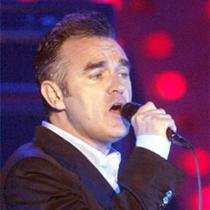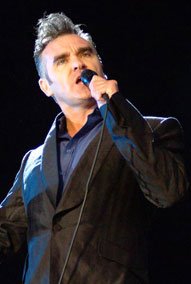All of this is to say that this past Tuesday's release of Ringleader of the Tormentors finds its creator at the peak of his vogue, with expectations to match such a lofty reputation. For those of us who found in his most recent success vindication (my self included) there comes with the obvious anticipation for the new album, a feeling of anxiety and even dread -- will it be ordinary enough to push Morrissey back to his Southpaw Grammar-Maladjusted-phase of reduced stature. You see, in Morrissey we start to glimpse what could have been, an alternative music history, a possible world where The Smiths were as big as The Beatles and where all other musical injustices have been righted. Yes, we see this in Morrissey, whose graceful transition into middle age (both physically, and more importantly, vocally) reminds one of no one so much as Frank Sinatra.

Like Nancy's dad, Mozzer's solo work can't exactly be said to challenge our sonic assumptions -- even his much-heralded YATQ sounded very old fashion, when compared to the other best records of its year. Yet to even make this observation is to miss the point when it comes to Moz; no, the point is that Morrissey has always challenged our assumptions about popular music when it comes to content, as always delivered with an unprecedented immediacy for popular music, whether it is in tandem with Johnny Marr's brilliant, and often quite unconventional song-writing for The Smiths, or with his less vanguard solo career. Morrissey is always Morrissey, a genre unto himself, a popular music of the utmost literary pedigree and one in which rock's fundamental presuppositions are questioned: the sex, drugs and rock-and-roll lifestyle has always been anathema to rock's best-known celibate straight-edger. For Morrissey, however, it's never been about morality, but rather about discontent -- his is the only truly punk corpus; Morrissey hates everything.
Well, while, this might be an exaggeration, Morrissey's aesthetic and his content are as always essential to an understanding of his latest instantiation of his own personal genre. Ringleader of the Tormentors finds the "Pope of Mope" on the heels of both unmitigated success and in a change of scenery: the Los Angeles transplant (remember: "we look to Los Angeles for the words that we use, London is dead") has relocated to the Eternal City, Rome. From the strong opening track, "I Will See You in Far Off Places," a change is evident, with its Oriental themes and instrumentation. Then again, as with YATQ's "America is Not the World," Morrissey opens with a confrontation of US foreign policy. Yet, whereas Mozzer concludes the earlier opener with the strangely touching repetition of the line "I love you" over and over (referring to his adopted homeland), here he seems to be addressing some anonymous one outside the US, perhaps Muslim, as he says "if your God bestows protection upon you... and if the USA doesn't bomb you... I believe I will see you."
Of course the "one" in ROTT is ambiguous and open to slippage, as is the addressee, interestingly (though not unprecedentedly -- his masterpiece "I Know it's Over" makes very good use of this): perhaps the most interesting instance of the latter being teh similarly exceptional "Dear God Please Help Me," track 2, where he sings "Then he motions to me... with his hand on my knee... dear God did this kind of thing happen to you?" At once imploring God and seemingly addressing a confident, Morrissey shows himself as always to be adept with double meanings -- though we must remember anything is possible with this forgiver of Jesus.
As far as his sexuality is concerned, the always elusive Morrissey – is he gay, straight, bi-sexual, a-sexual? -- leaves some pretty compelling clues on the excellent mid-tempo third track, "You Have Killed Me": "Pasolini is me..., Visconti is me..." Indeed, by name checking Italy's two most famous homosexual directors (with complications, importantly -- though the latter could be his producer as well) perhaps we can finally lay to rest the speculation; evidently, Morrissey himself has even admitted to recently breaking his long-held practice of celibacy, to say nothing of his rumored spottings at gay night-spots.

Musically, the following track, "The Youngest Was the Most Loved," with its refrain, "there is no such thing in life as normal," rates as a highlight and instantly establishes itself as Morrissey classic, particularly for its children's chorus repeating the above line, though it is by no means one of his lyrical masterpieces. In fact, ROTT gets off to a rather remarkable start musically, continuing into the proceeding, up-tempo, "In the Future When All is Well."
After the forgettable sound of "The Father Who Must Be Killed," a stilting mid-tempo number, Morrissey offers another essential track, "Life is a Pigsty," which displays Tony Visconti's lush productions at their richest. (In placing the track in the center of the album, Morrissey uses a strategy similar to the construction of his solo debut, Viva Hate [1988], where "Late Night, Maudlin Street" serves a smiliar function.) Of course, it is not simply this track's aural terrain, but the repeated lyric "even now, in my final hour of my life... I'm falling in love again," which establishes its importance to ROTT -- has he found someone, is he referring to Rome, etc.?
Then, demonstrating the intelligence of ROTT's track sequence, Morrissey tells us "his one true love is under ground": now, is he talking about The Smiths and his partnership with Marr or a friend or lover of the type that Mark Simpson, in Saint Morrissey, claimed prompted his masterpiece Vauxhall and I (1994)? Musically, this track, "I'll Never Be Anybody's Hero Now," another strong entry, operates in the "I Am Two Persons" mold.
In the subsequent four tracks, the highlight would seem to be #10, "To Me You Are a Work of Art," a torch-song with the Morrissey difference: you see, he would give you his heart, if he had one. More than any other song on the album -- with the exception of his first single, the uber-catchy "You Have Killed Me" -- it is easy to imagine Morrissey performing it live, which at this point is what it's all about. Not so much seeing Moz in the flesh, though there are few who are any better, but having Morrissey in the flesh, whatever he decides to do with it. Besides, we feel he has already given us his heart -- nobody has laid his thoughts and feelings so bare in their art as has Morrissey from "Hand in Glove" onward.
No comments:
Post a Comment